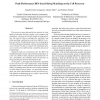Free Online Productivity Tools
i2Speak
i2Symbol
i2OCR
iTex2Img
iWeb2Print
iWeb2Shot
i2Type
iPdf2Split
iPdf2Merge
i2Bopomofo
i2Arabic
i2Style
i2Image
i2PDF
iLatex2Rtf
Sci2ools
118
click to vote
IPPS
2007
IEEE
2007
IEEE
Peak-Performance DFA-based String Matching on the Cell Processor
The security of your data and of your network is in the hands of intrusion detection systems, virus scanners and spam filters, which are all critically based on string matching. But network links are getting faster and faster, and string matching is getting more and more difficult to perform in real time. Traditional processors are not keeping up with the performance demands, whereas specialized hardware will never be able to compete with commodity hardware in terms of cost effectiveness, reusability and ease of programming. Advanced multi-core architectures like the IBM Cell Broadband Engine promise unprecedented performance at a low cost, thanks to their popularity and production volume. Nevertheless, the suitability of the Cell processor to string matching has not been investigated so far. In this paper we investigate the performance attainable by the Cell processor when employed for string matching algorithms based on Deterministic Finite-state Automata (DFA). Our findings show...
Related Content
| Added | 03 Jun 2010 |
| Updated | 03 Jun 2010 |
| Type | Conference |
| Year | 2007 |
| Where | IPPS |
| Authors | Daniele Paolo Scarpazza, Oreste Villa, Fabrizio Petrini |
Comments (0)

